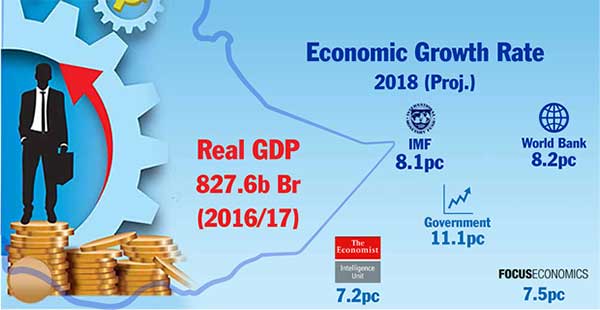
Fortune News | May 13,2023
A red hue glistened the Haile Garment area, the vegetable hub of Addis Abeba, last week. It was prompted by heaps of fresh tomatoes flooding into the market at nearly a fifth of the selling price from five months ago.
For Legese Bekele, it equated to increased sales as the price dropped to 15 Br a kilo from a staggering 80 Br. With a profit margin of two birr per kilo for the tomatoes coming from Meqi town, Oromia Regional State, Legsse expects a resurgence in prices as fasting seasons loom close. However, he was disappointed in the turnout as he spent his day calling out to passersby potential customers.
"They still haggle for lower prices," he told Fortune.
An elevation in production has partly fueled the drop in prices for tomatoes. Most farmers in high-producing areas like Meqi switched from onions due to the increased yield rates. The resistance to fungal diseases of tomatoes has also contributed to the farmers preferring it over onions.
Nearly a third of the 9,000 farmers within the Meqi Vegetables & Fruit Farmers Union have opted to cultivate tomatoes this year. General Manager Kumasa Gudina reasoned that even with the elevated production costs of tomatoes, farmers benefit from nearly a three-fold difference in yield for a hectare from onions, which average around 150qtl in a harvest cycle.
According to Kumasa, increased sales from bulk production is the allure for shifting to tomatoes. He revealed that the productivity of onion bulb varieties has plummeted, which prompted the Union to appeal to the Melkasa Agricultural Research Center nearby.
However, the unprecedented surplus has hurt the farmers' profitability.
One of them is Jimma Gelash, 26, scathed by the oversupply. He spent around 200,000 Br buying seeds, fertiliser, and chemicals. Fearing that vehicles would not return, Jimma sold 160 boxes at six Birr a kilo, as soon as transportation routes reopened, two weeks ago.
"It's not even covering my production cost," he told Fortune. "It's not like I can store them without perishing."
Jimma's five-hectare plot, of which half is covered in tomatoes, can yield upwards of 20qtl in each harvest, with the hybrid seed variety allowing him to reap up to six times after sowing once.
Close to 86,000hct of farmland in Oromia Regional State has been covered in tomato seeds this year, pushing the five-month production amount to seven times that of the prior year at 5.6 million quintals. The Oromia Agricultural Bureau is forecasting around 17.3 million quintals of tomato yield for the year.
Sheleme Bayera, an irrigation expert at the Bureau, blames the tangled chain of intermediaries stretching from farms to urban markets for what he perceived as the exploitation of the farmers.
"Farmers have little bargaining power," he told Fortune.
Sheleme suggests that anxiety over the perishability of the tomatoes fueled by the broker's calamitous whispers into the ears of the farmers who have neither knowledge nor access to cold storage facilities caused the price slump.
"The threat of rainfall compounds fears," he said.
Meanwhile, efforts are underway to expand market options for farmers to mitigate the impact of the price dive caused by overproduction, according to Tesfaye Gesho, deputy head of the Oromia Trade Bureau.
"We are looking for buyers in other regional states," he said.
Tesfaye indicated that finding affordable price points for consumers is one of the main priorities of the Bureau. A sentiment shared by the Addis Abeba Trade Bureau, which has been providing access to tomatoes at eight Birr a kilo through its Sunday market outlets distributed across the city.
"We're a consumer city after all," said Sewnet Ayele, communication director.
Solomon Kebede, head of the vegetable and herb production desk at the Ministry, said the dramatic price variations maybe a result of the proliferation of commercial farmlands and the heavy involvement of brokers.
Founded by Fisseha Eshetu (MD) three years ago, Purpose Black Ethiopia has been bringing produce straight from farms. Dubbed Ke'Geberew, it acquired a sizeable market share due to its competitive prices. In the words of Deputy Board Chairman and legal advisor Ermias Berhanu (PhD), the Company's prices do not arise from observing the market but through careful assessment of production costs.
"We would drop prices further if we could," he told Fortune.
Purpose Black came to public attention following the highly publicised real estate marketing scheme a few months ago. While its technique has been subject to public scrutiny for only allowing bulk discounts when buyers purchase multiple items, the eight 'Ke-Geberew' stores in the capital have brought some respite to the inflationary woes of urbanites.
A kilo of tomatoes for 18 Br and onions at 25 Br, a fifth of market prices, are attractive for consumers like Embet Worku. The mother of three who earns 2,000 Br monthly wages left out tomatoes from her grocery list after prices climbed to 80 Br. After learning of the price, she added two more kilos to her initial purchase plans.
"I can freely cook my meals now," she told Fortune.
The question "at what cost?" lingers in the minds of farmers like Girma Golte, as the issue persists further south. They claim security concerns have not allowed them to travel to nearby markets in Wolaita, Halaba and Shahaemene towns in search of better prices. Girma is dismayed to learn that the price dropped to a fourth of the amount from 40 Br.
"I just don't know the reason," he said.
Girma sold two trucks full of tomatoes two weeks ago at the new price point after 600,000 Br production costs across his 2.5hct plot. He hopes the price will improve in the coming weeks.
"I'm far from breaking even," said the lifelong farmer.
Transportation hurdles and storage issues are recognised by the Agriculture and Trade ministries.
The Ministry of Regional Trade & Integration officials point to the combination of underdeveloped preservation mechanisms, elevated production and a seasonal upsurge in production for the dive in tomato prices. They are trying to figure out market linkage problems in the supply chain and prevent price failures in seasons of elevated production, according to Gizaw Tekele, the senior advisor.
"Lack of cold chain facilities is identified as a national problem," he said.
Prompted by the difficulty, officials at the Ministry of Agriculture have submitted a proposal to the World Bank for a 30-million-dollar agriculture hub. However, officials have a different outlook.
The Ministry prompted regional bureaus to collect data from remote areas through the deployment of extension workers while they facilitated the distribution of hybrid seeds to increase production. Abdella Tegene, head of the Horticulture Bureau, believes the farmers were looking to take advantage of the price hike that occurred in the summer and shifted their produce.
"Poor assessment of demand raised production," he told Fortune.
Systemic issues in farming and marketing practices are identified by experts. Agriculture economist Assefa Tilahun points to the lack of agro-processors and intermediate industry linkages as contributing to supply shocks. He emphasises the need for producers to assess feasible prices before extensive cultivation, highlighting the impact of fuel prices and inadequate transportation facilities.
"A bulk of harvested horticulture perishes," he said.
Assefa advocates for enhanced collaboration within farmer cooperatives to improve bargaining power, reduce wastage, and explore broader market distribution for agricultural products, pointing to 40 Br kilo prices in Gonder town, Amhara Regional State.
"Demand is centralised in a few areas when it should be nationally distributed," said Assefa.
PUBLISHED ON
Feb 17,2024 [ VOL
24 , NO
1242]

Fortune News | May 13,2023

Viewpoints | Dec 04,2020

Commentaries | Oct 23,2021

Verbatim | Jun 29,2024

Commentaries | Jan 09,2021

Editorial | Jul 10,2021

Viewpoints | Dec 23,2023

News Analysis | Jan 05,2020

Radar | Aug 11,2024

Editorial | Feb 13,2021

Dec 22 , 2024 . By TIZITA SHEWAFERAW
Charged with transforming colossal state-owned enterprises into modern and competitiv...

Aug 18 , 2024 . By AKSAH ITALO
Although predictable Yonas Zerihun's job in the ride-hailing service is not immune to...

Jul 28 , 2024 . By TIZITA SHEWAFERAW
Unhabitual, perhaps too many, Samuel Gebreyohannes, 38, used to occasionally enjoy a couple of beers at breakfast. However, he recently swit...

Jul 13 , 2024 . By AKSAH ITALO
Investors who rely on tractors, trucks, and field vehicles for commuting, transporting commodities, and f...

Jul 5 , 2025
Six years ago, Ethiopia was the darling of international liberal commentators. A year...

Jun 28 , 2025
Meseret Damtie, the assertive auditor general, has never been shy about naming names...

Jun 21 , 2025
A well-worn adage says, “Budget is not destiny, but it is direction.” Examining t...

Jun 14 , 2025
Yet again, the Horn of Africa is bracing for trouble. A region already frayed by wars...